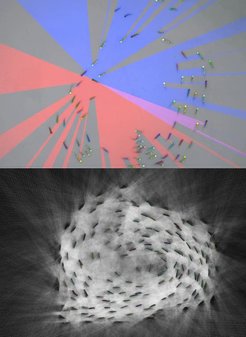Computational Approaches to the Experimental Study of Animal Collectives

Abstract Understanding collective action in biological processes is a central challenge, essential for achieving progress in a variety of fields ranging from the organization and evolution of neural decision-making circuits, to the coordinated communication among cells, or animals, to the dynamics of information exchange among sophisticated organisms, and the emergence of complex societies. Consequently the study of collective behavior naturally spans scales, from how neural circuits control individual behavior, to the analogous issue of determining the structure and function of the communication network among organisms that gives rise to emergent group, and population-level, behavior. Insights and paradigms from the study of collective behavior help reveal unifying principles, as well as important differences, across scales of biological organization.
We seek PhD candidates with an interest in developing and employing computational approaches (2D/3D computer vision, machine learning, closed-loop virtual reality environments etc.) to study of collective animal behavior in the lab or field. Expertise in programming is essential, and it is anticipated that candidates may have backgrounds in computer science, physics, applied mathematics, quantitative biology or engineering science.
The Max Planck Society and the University of Konstanz are equal opportunity employers that are committed to provide employment opportunities to all qualified applicants without regard to race, color, religion, age, sex, sexual orientation, gender identity, national origin, or disability. They seek to increase the number of women in those areas where they are underrepresented and therefore explicitly encourages women to apply.
Keywords self-organization, swarm, school, behavior, information, automated tracking, machine learning, virtual reality, inverse methodologies.
Main adviser Iain Couzin, MPI for Ornithology + University of Konstanz
